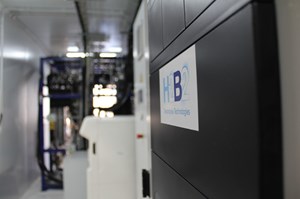News
H2B2 electrolyzers will expand GP JOULE’s green H2 production
H2B2, a global technology company in the H2 energy sector, will provide five 2-MW electrolyzers for green H2 projects initiated by GP JOULE, a system provider for integrated energy solutions from sun, wind and biomass as well as a partner at supply level for electricity, heat, electromobility and H2.
In total, the 10 MW of electrolyzing capacity will be able to supply up to 4,300 kg/d of green H2 thanks to their integration with a photovoltaic or wind system. The German company will receive the electrolyzers starting in 2023. They will go into operation in 2024.
“We have set ourselves the goal of using renewable energies to produce climate-friendly fuel and thus decarbonize heavy-duty transport. To achieve this, we rely on strong partners such as H2B2, who, like us, specialize in production with renewable energies and have many years of experience in the market. We are very much looking forward to working together in the future,” said GP JOULE Hydrogen Managing Director André Steinau.
Expansion of refueling station network
Germany has the fourth largest network of H2 refueling stations in the world after Japan, South Korea and China. According to the latest data from the International Energy Agency, out of a total of 730 in operation in 2021, 13% were in the country.
“GP JOULE has incredibly ambitious projects underway that are going to accelerate decarbonization goals and foster the transition to a zero-emission vehicle fleet in the coming decades. That this company chooses H2B2’s technology to expand Europe’s largest network with 5 electrolyzers demonstrates the strength of our innovation model,” said Anselmo Andrade, CEO of H2B2.
The European Union is promoting the necessary regulation for the development of the infrastructures that will allow green H2 to drive sustainable mobility in the coming years. In October last year, the European Parliament approved the Alternative Fuels Infrastructure Regulation to implement H2 vehicle refueling stations every 100 kilometers along the European road network by 2028. The Regulation establishes more ambitious standards than those initially proposed by the European Commission and will enter into force once these two institutions reach a consensus with the EU Council.


